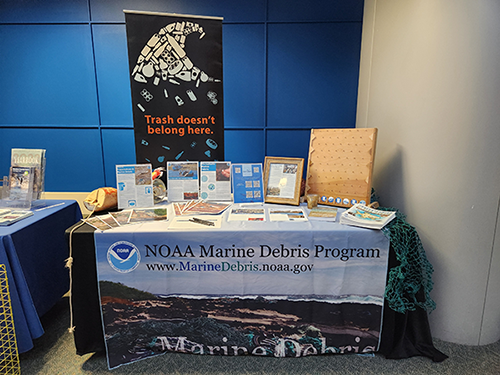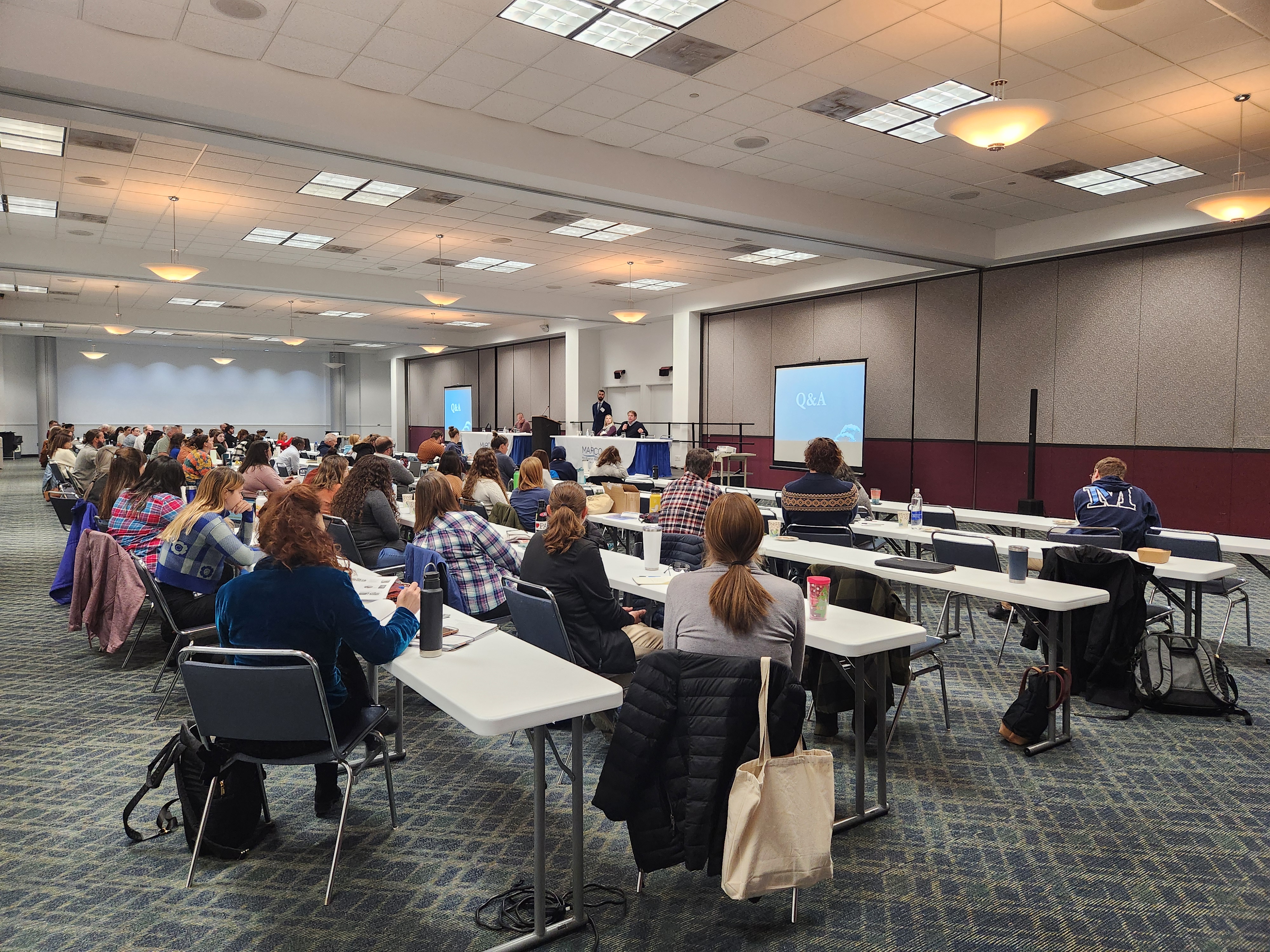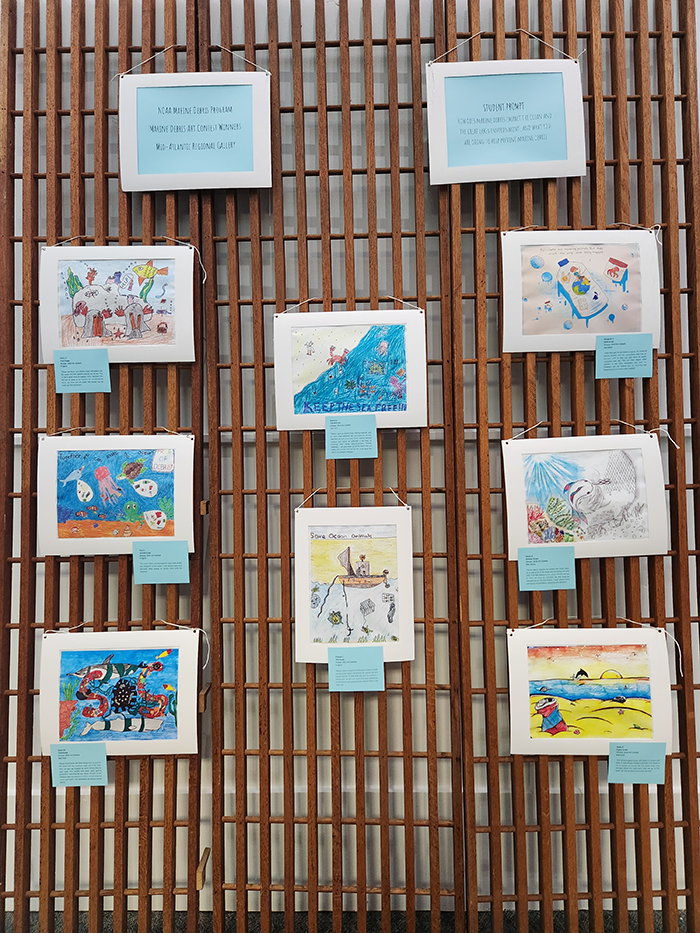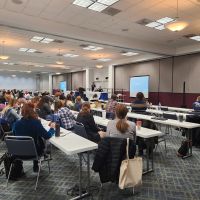NOAA Marine Debris Program Participates in Mid-Atlantic Marine Debris Summit
DEC. 18, 2023 — On December 6th and 7th, Mid-Atlantic Regional Coordinator Katie Morgan participated in the Mid-Atlantic Regional Council on the Ocean’s (MARCO) Marine Debris Summit, held in Ocean City, Maryland. This two-day summit is typically held every two years. This year’s Summit was held in-person for the first time since 2019, and brought together over 100 marine debris practitioners and interested individuals to discuss current and emerging marine debris fields; identify opportunities to incorporate diversity, equity, and inclusion into marine debris efforts; and highlight solutions to marine debris prevention and reduction.

The Summit consisted of sessions organized around key topics - microplastics, storm debris, community engagement, large scale removal, prevention and interception, and policy. In addition, a marine debris trivia night was held to foster connection among participants while testing their knowledge on a wide range of marine debris topics.
On day one of the Summit, Morgan led a session on coastal storm debris alongside presenters from the Virginia Port Authority, Maryland Department of Natural Resources, and the Delaware Department of Natural Resources and Environmental Control. Speakers shared information and case studies related to preparation for and response to storm events that generated marine debris in the Mid-Atlantic region, including multi-jurisdictional flooding events, tornados, and hurricanes. Morgan also shared information on the Marine Debris Emergency Response Guides which the NOAA Marine Debris Program has produced for all five Mid-Atlantic states.
In addition, as part of the art gallery featured at the Summit, Morgan showcased the NOAA Marine Debris Program marine debris art contest winners from throughout the Mid-Atlantic region. One piece of art was selected from each grade category (first through eighth grade) and put on display in the main conference hall throughout the Summit.
Across many of the Summit sessions, NOAA Marine Debris Program grant funded projects were featured. Session titles for those presentations from current and past grantees included:
- ‘Transport of marine microplastic debris in Delaware coastal waters and implications for buoyant zooplankton’ by Todd Thoman of the University of Delaware (FY21 research grant)
- ‘Effects of Polyethylene Terephthalate Microfibers on Mud Crab Panopeus herbstii Throughout Larval Development’ by Hayden Boettcher of the University of Delaware (FY19 research grant)
- ‘Bringing Regional Partners Together to Remove ADVs and Forge a New Statewide Approach’ by Karen Forget of Lynnhaven River NOW (Bipartisan Infrastructure Law grant)
- ‘BoatUS Foundation’s ADV Grant Program’ By Alanna Keating of BoatUS Foundation (Bipartisan Infrastructure Law grant)
- ‘10 years of DFG removals in New Jersey coastal bays – the keys to success depend on fisher involvement’ by Steve Evert of Stockton University (Inflation Reduction Act grant)
- ‘Nationwide Fishing Trap, Removal, Assessment, and Prevention (TRAP) Program’ by Renee Sanders of the Virginia Institute of Marine Sciences (Bipartisan Infrastructure Law grant)
- ‘Mitigation of stormwater debris in the Great Lakes’ by Christy Tyler of the Rochester Institute of Technology (FY21 Research grant)
NOAA Sea Grant funded marine debris projects were also featured during the Summit, including community action coalition projects led by New York, New Jersey, and Delaware Sea Grants.
Morgan serves as the Federal Co-Lead to the MARCO marine debris workgroup, alongside State Co-Lead Will Isenberg of Virginia’s Coastal Zone Management Program. The Summit planning team consisted of federal, state, and nongovernmental representatives from across the Mid-Atlantic region.
This Summit successfully brought together marine debris practitioners across the region to discuss ongoing efforts while strengthening relationships and forging new collaborations.
more images




